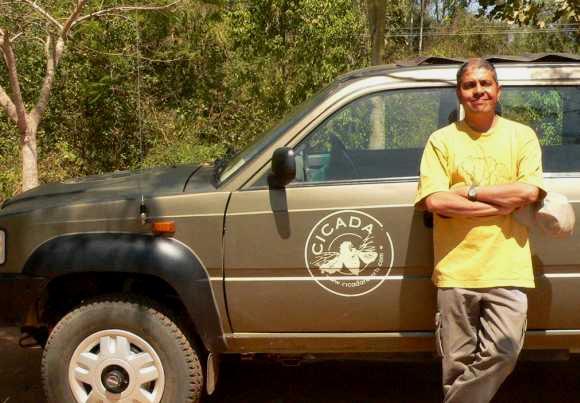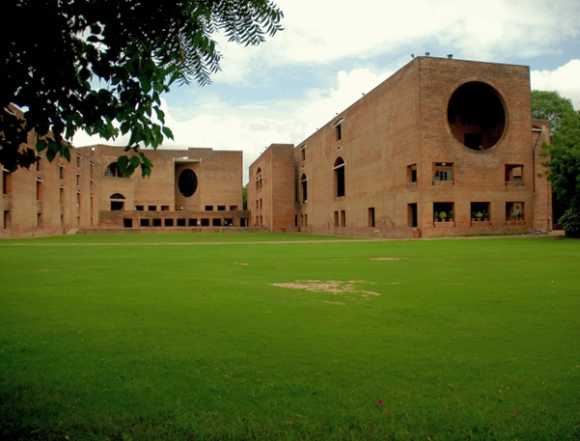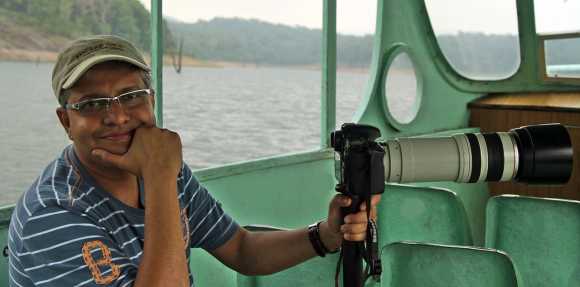Prasanna D Zore
Tiger Ramesh. How does that sound as a name for a CEO? Tirumalai Govindan Ramesh, chief executive officer of Chennai-based CSS Corp, a global information and communications technology company, explains over the phone.
"It is a very south Indian way of naming people. Like my name T G Ramesh became TGR and TGR became Tiger," he says in a self-effacing manner.
"'Tiger' has been with me for 17 years," he crackles oozing energy in his trademark style. It is this energy, Tiger adds, that has helped him surmount challenges in his professional and personal life.
An electronics and communications engineering graduate from Madurai Kamaraj University, Tiger was never too serious about his academics. "I hardly used to attend classes," he says of his college days, "prepare just before the exams and ensure that I always passed with first class marks." However, the one thing he did earnestly was to understand his subject inside out.
"I never prepared for the sake of writing an examination," says Tiger whose primary role as CEO of CSS is to take the company towards a successful IPO in the next 18 to 24 months about which he is pretty confident. His confidence stems from his belief in his dictum: stay focussed to achieve success.
Tiger spoke to Prasanna D Zore about his life as a serial entrepreneur, how he progressed in his long career, his success mantras, dos and don'ts for start-ups, and about why he chose to head CSS instead of joining one of the top three Indian IT behemoths at senior management level.
From BPL to Nortel: The journey in brief
Image: Campus of IIM-APhotographs: IIM-A
No MBA from an IIM for you...
No. I tried going to the US to do my Masters but my visa got rejected in 1989. In those days getting a student visa was very difficult. In the 80s students were treated as potential immigrants. Only in the latter part of the 90s getting visas to the US became easier.
Immediately after that I started my career with BPL and did not try to get admission into IIMs.
Career progression... what happened after BPL?
In BPL I joined as a production engineer manufacturing telephone systems. While there, I began to understood the telecommunication switching quite well, so I thought I could do a good job in sales. When I requested BPL to move me into sales, one part of the company approved of it while the other opined that I should stick to production and not switch to sales. They said I was good at what I was doing and they could not afford to lose me from production. But I wanted to be in sales. So I went ahead and joined their competitor Crompton Greaves who gave me a job in their sales division.
But after that BPL came back and said they could accommodate me into sales. But then Crompton had already decided to pack me off to Chandigarh for training. Since I had already joined Crompton there was no question of coming back to BPL.
After Crompton Greaves...
I was there for three-and-a-half years in sales and later had an 18-month stint in the Middle East working for the Bahwan Group in Muscat. Since my wife could not pursue anything there of much value we decided to come back to India in 1993. In India I joined Microland working for Pradip Kar. It was a golden time for the company; it was the de facto number one in the networking industry in India. I had a good run there and a lot of my foundation for my future was strengthened in Microland. I joined as a business manager and ended up heading all-India sales.
Then I joined Nortel Networks and worked with them for three-and-a-half years as their country head for India and SAARC region.
'Wildlife resorts business frustrated me'
Photographs: IIM-A
After Nortel...
I left Nortel in 1999 to start my first venture Bangalore Labs with four of my friends. We worked on a first-of-its-kind remote infrastructure management from India. Singapore-based Planet One acquired Bangalore Labs in 2002. In the same year I spent a couple of months at various wildlife sanctuaries in India. In 2002 Phaneesh (Moorthy presently heading iGate-Patni after iGate took over the latter) and I started Quintant Services, a platform-based BPO, again a first-of-its-kind in India. Within seven months of our operations iGate acquired Quintant. That's how I landed up at iGate heading its BPO business, and Phaneesh became the CEO.
How did you venture into starting wildlife resorts?
I wanted to take a quick break from the BPO industry in 2002. And when I travelled to Africa I saw that eco-tourism was very well organised in Kenya. I was confident that I could do something similar in India. In Karnataka government-owned company Jungle Lodges and Resorts was being managed extremely well. That was an inspiration. I wanted to take the same model across India instead of just one state. Eco-tourism in India was still unorganised and I wanted to create an organised tourism sector.
Sadly, we couldn't do much. We started two operations, third was in conceptual stage and we had acquired land for the fourth one. We sold the business to Cafe Coffee Day. We were a little frustrated because this business was attracting too much NGO attention. It was getting a little too much to battle these wars coming from all directions. Fighting court cases leading to unnecessary delays didn't make much sense and so we sold the business.
'Between the heart and the mind, just follow your heart'
Photographs: IIM-A
Important career lessons you learnt...
My career taught me to value the importance of relationships that I built with people along the course of a long career. Relationships are important and key irrespective of when they were built or initiated. When I say relationships, these are relationships built on trust. These relationships helped me a lot. I am still in touch with people who I met 20 years back, be it my customers or colleagues.
Having solid understanding of the domain one is in makes a huge difference. If it is telecommunications, understand why a voice call gets switched. If it is data, understand how data is transferred from one location to the other point. So it is very important to understand the basics of the business you are in.
Dos and don'ts for Indian youth to make a great career...
First of all you have to believe in yourself. Go for it.
At a younger age there is always a tussle between the heart and the mind. Just follow your heart. Mind always analyses, gives you lot of data and many times that data is not favourable to make the right decision. The data staring at you may always be in favour of a decision you may always regret later. So, always follow your heart.
'My biggest strength has been people and my network'
Photographs: IIM-A
How did CSS happen?
After my wildlife venture I started a venture to make and market LEDs (light emitting diodes) which Wipro acquired. But after that I wanted to come back to the IT sector. I wanted to play a scale-game this time which could evolve into a potential IPO story. My last scale-game was iGate. Simultaneously, CEOs of two of the top three IT companies in India had approached me to join them at the senior management level.
For me, though, CSS was attractive because it had the potential to ramp up in scale and go for an IPO and I had the opportunity to achieve this dream along with my team. Next year we will achieve a critical metric for the company that will allow us to go public.
How big is CSS in terms of number of people?
Globally, we have strength of 5,500 people. In India our employee strength is 4,000. In the next 18 to 24 months we plan to roughly have a top line of US $200 million.
Challenges you faced and how did you overcome them?
My biggest strength has been people and my network. Whenever surrounded by challenges -- either in personal or professional life -- I have always relied on people. Since I am a high-energy person it takes a lot of challenges to drain me down.
'Future looking business plans are actually a waste of time'
Photographs: IIM-A
You have been a part of a number of start-ups. What would be your dos and don'ts for start-ups?
Broadly, start-ups must remember two things. First, it is the team that helps achieve a goal. You have to be absolutely clear of who brings what to the table.
Normally, a bunch of friends get together to start a company. Then it is very important to bring clarity about each founder's specific role in the venture. The group needs to have one leader. You cannot have everybody playing equal parts in the founding team.
Secondly, start-ups have to spend lot of time in validating assumptions that they make. Many times people spend time on building future business plans and projections. Typically it is a spreadsheet exercise. That is not at all important according to me. I will tell you, NO ONE is going to rightly predict what is going to happen next year or a year after that.
I don't believe when people say this is how my business will grow five years from now. It is actually a waste of time. One may want to know the broad trend but no way it is going to happen exactly like it is on your spreadsheet for one year, two years and three years down the line.
So, it is important to validate assumptions start-ups make. Once these are validated they should not really worry about taking the business forward.
So far what I have observed in India is people tend to attach over importance to their five-year financial plans rather than spending more time on validating assumptions.
Finally, your success mantras...
To different people success means different things. For me success means -- and this does not mean that I have achieved everything in life -- having a happy life, happy family with lots of well wishers around.
Success in professional life is a moving goal. I came into CSS because I wanted to have an IPO story. Once I reach there I may do something else. Move the goalpost. Being a CEO does not make you successful. That is just a tool to achieve your goal. For me success would be having happy customers and happy employees of CSS.
My success mantra is stay focussed. There is no other choice.







Comment
article